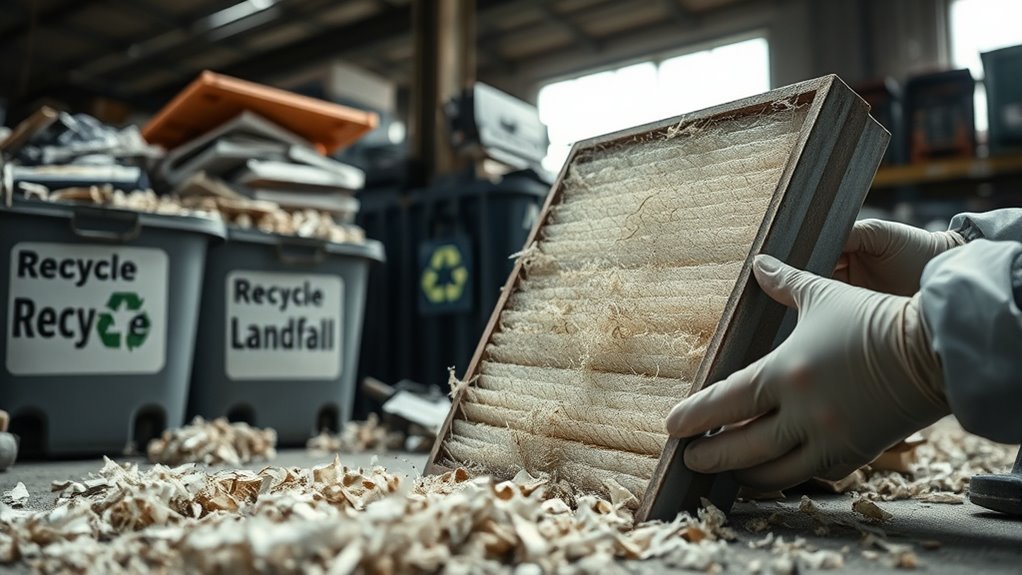Recycling HEPA filters raises ethical concerns because they can contain harmful pathogens and medical waste, making safety a top priority. Proper disposal usually involves incineration or secure landfilling to prevent health hazards and environmental contamination. Recycling isn’t recommended unless effective sterilization methods are confirmed, which is currently complex. Balancing safety, environmental responsibility, and public health is essential. If you want to understand the best practices and future solutions, keep exploring this important topic.
Key Takeaways
- Recycling HEPA filters raises health risks if they remain contaminated with pathogens, challenging ethical considerations of safety.
- Proper disposal methods, like incineration or secure landfilling, prioritize public health over recycling convenience.
- Ethical disposal balances environmental impact with the need to prevent disease transmission and environmental contamination.
- Emerging sterilization technologies may enable safe recycling in the future, but current practices favor incineration for infected filters.
- Using certified waste services and following established regulations ensures responsible disposal aligned with ethical health and environmental standards.

As more people become aware of the environmental and health impacts of waste disposal, the ethics surrounding HEPA filter disposal have gained increasing importance. HEPA filters are designed to trap tiny particles, including bacteria, viruses, and other pathogens, making them essential in medical environments and for air purification. However, when these filters are used, especially in healthcare settings, they often become contaminated with medical waste that can pose serious health risks if improperly disposed of. This raises a critical question: how should you handle the disposal of used HEPA filters to minimize environmental impact while ensuring safety?
Medical waste, including used HEPA filters, is classified as hazardous due to potential infectious agents and chemical residues. Improper disposal can lead to the spread of disease, environmental contamination, and legal liabilities. As awareness about these risks grows, many organizations and individuals are seeking more responsible ways to manage used filters. Recycling or safely reprocessing HEPA filters might seem like a sustainable solution, but the reality is complex. The filter’s intricate fiber structure makes thorough decontamination challenging, and any failure to properly sterilize the filters before recycling could lead to the reintroduction of harmful pathogens into the environment.
From an ethical standpoint, it’s essential that you prioritize safety and environmental responsibility. While recycling sounds environmentally friendly, it shouldn’t come at the expense of public health. Many manufacturers and waste management protocols recommend incineration or secure landfilling for contaminated HEPA filters. Incineration effectively destroys pathogens, considerably reducing health risks, but it also releases emissions that contribute to air pollution if not properly managed. Landfilling, on the other hand, might seem like a simpler solution, but it can lead to leaching of contaminants into soil and water, especially if the filters aren’t properly contained.
The dilemma lies in balancing environmental impact with public safety. Some innovations are emerging, such as sterilization techniques that could enable safe recycling, but these are not yet widespread or proven at scale. Until such options become standard, the most ethically responsible approach involves following strict disposal regulations designed for medical waste. This typically means using certified waste disposal services that handle contaminated filters safely, minimizing environmental harm and preventing potential health hazards.
In addition, increased research into filter sterilization methods could eventually provide safer recycling alternatives, aligning environmental sustainability with public health needs.
In the end, you must consider both the environmental impact and the safety of others when disposing of HEPA filters. Recycling might be ideal in theory, but only if it’s done in a way that guarantees sterilization and prevents contamination. Until then, following established guidelines and opting for secure disposal methods remain the most ethical choices, protecting both public health and the environment.
Frequently Asked Questions
Are There Biodegradable Alternatives to Traditional HEPA Filters?
You might wonder if there are biodegradable alternatives to traditional HEPA filters. While standard filters are made from synthetic fibers, eco-friendly alternatives use biodegradable materials like plant-based fibers or natural fabrics. These options break down more easily in the environment, reducing waste and pollution. Although they may not yet match the filtration efficiency of traditional HEPA filters, ongoing research aims to develop effective, sustainable, and biodegradable air purification solutions for a greener future.
How Does HEPA Filter Disposal Impact Local Waste Management Policies?
Have you considered how HEPA filter disposal influences waste reduction and policy compliance? Your waste management practices are impacted because improper disposal can lead to environmental harm and regulatory issues. Local policies may require specific handling or recycling protocols, making it essential for you to stay informed. Responsible disposal supports sustainable waste management and helps you meet environmental standards, ultimately contributing to a healthier planet and community.
Can Used HEPA Filters Be Safely Repurposed for Other Uses?
You might wonder if used HEPA filters can be safely repurposed. While filter sterilization techniques can sometimes make filters reusable, reuse safety depends on their condition and the contaminants they’ve captured. If the filters are damaged or heavily contaminated, reuse could pose health risks. Always prioritize proper testing and sterilization before considering reuse, and consult safety guidelines to guarantee that repurposing doesn’t compromise air quality or safety.
What Are the Global Regulations Regarding HEPA Filter Recycling?
Like a compass guiding sailors, global regulations steer HEPA filter recycling practices. You need to ensure international compliance and environmental policies, which vary widely. Some countries have strict rules to ensure safe disposal and recycling, while others lack comprehensive guidelines. You should stay informed about these regulations to avoid legal issues and protect the environment. Adhering to local and international standards ensures responsible handling and minimizes health risks.
How Does Filter Disposal Influence Indoor Air Quality Standards?
You should consider how filter disposal impacts indoor air quality standards because improper disposal can lead to filter contamination, releasing trapped particles back into the environment. This contamination compromises air quality, especially if filters are not properly handled or disposed of. Maintaining strict disposal practices helps ensure that indoor air remains clean and safe, aligning with air quality standards and preventing potential health risks caused by contaminated filters.
Conclusion
As you consider HEPA disposal, remember it’s like tending a garden—you must prune responsibly to guarantee future growth. Recycling filters isn’t just about waste; it’s about nurturing our environment and respecting the effort that went into their creation. Every choice you make is a seed planted for a cleaner, healthier tomorrow. So, embrace eco-friendly practices, because in the end, we’re all part of the same ecosystem—what you discard today shapes the world of tomorrow.









